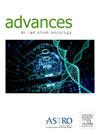放射肿瘤学神圣时刻的定性探索
IF 2.2
Q3 ONCOLOGY
引用次数: 0
摘要
目的虽然放射肿瘤学服务有很多好处,但在护理晚期癌症患者时也会产生情绪负担。职业倦怠是肿瘤科普遍存在的问题。现有文献建议重新关注医护人员的目标感,以防止倦怠。"神圣时刻 "是指人与人之间深层次相互联系的时刻,伴随着敬畏、喜悦和感恩等精神情感。这些时刻会在医疗机构中自然出现,为患者和医疗服务提供者带来潜在的益处。在 2023 年 3 月至 5 月期间,我们对美国国家癌症研究所指定的一家大型癌症中心的放射肿瘤咨询服务的医生、注册护士和高级医疗服务提供者进行了 13 次半结构化访谈,对神圣时刻在放射肿瘤医疗工作者中的普遍性和影响知之甚少。对访谈进行记录、转录和分析,以确定关键主题。在接受访谈的 13 名医护人员中,12 名受访者表示在其临床职业生涯中至少经历过一次神圣时刻。所有受访者最初都不熟悉 "神圣时刻 "这一术语,但经解释后,所有人都理解了这一概念。访谈结果分为四个方面:(1) 共同要素;(2) 影响;(3) 障碍;(4) 提供者的反应。共同要素包括医疗服务提供者与患者之间的深度互联时刻,通常涉及临终患者。这些时刻的影响最常被描述为增加了他们角色的使命感。缺乏与患者相处的时间是最常见的障碍。神圣时刻有助于使患者人性化、减轻医护人员的职业倦怠、增强目的感和工作满意度。本文章由计算机程序翻译,如有差异,请以英文原文为准。
A Qualitative Exploration of Sacred Moments in Radiation Oncology
Purpose
While there are many benefits to radiation oncology services, there can be emotional burdens in the care of patients with advanced cancer. Burnout is a prevalent problem in oncology. Existing literature suggests refocusing attention on providers’ sense of purpose to protect against burnout. “Sacred moments” are moments of deep interconnection between people with accompanying spiritual emotions such as awe, joy, and gratitude. These moments naturally occur in health care settings, offering potential benefits to both patient and provider. Little is known about the prevalence and impact of sacred moments among health care workers in a radiation oncology setting.
Methods and Materials
We conducted an exploratory qualitative study of 13 semi-structured interviews among physicians, registered nurses, and advanced practice providers of a radiation oncology consult service at a large National Cancer Institute-designated cancer center between March and May 2023. Interviews were recorded, transcribed, and analyzed to identify key themes. Data were systematically coded and analyzed in NVivo software and organized into a codebook organized by domains and themes.
Results
Of the 13 health care workers interviewed, 12 interviewees reported experiencing at least one sacred moment during their clinical careers. None of the interviewees were initially familiar with the term; however, all understood the concept once explained. Interview findings were organized into four domains: (1) common elements, (2) impact, (3) barriers, and (4) provider reactions. Common elements included a moment of deep interconnection between provider and patient, often involving end-of-life patients. The impact of these moments was most commonly described as an increased sense of purpose in their role. Lack of time with patients was the most common barrier.
Conclusions
Sacred moments are commonly experienced by health care workers in a radiation oncology consult service. They helped to humanize the patient, buffer against provider burnout, and increase a sense of purpose and job satisfaction.
求助全文
通过发布文献求助,成功后即可免费获取论文全文。
去求助
来源期刊

Advances in Radiation Oncology
Medicine-Radiology, Nuclear Medicine and Imaging
CiteScore
4.60
自引率
4.30%
发文量
208
审稿时长
98 days
期刊介绍:
The purpose of Advances is to provide information for clinicians who use radiation therapy by publishing: Clinical trial reports and reanalyses. Basic science original reports. Manuscripts examining health services research, comparative and cost effectiveness research, and systematic reviews. Case reports documenting unusual problems and solutions. High quality multi and single institutional series, as well as other novel retrospective hypothesis generating series. Timely critical reviews on important topics in radiation oncology, such as side effects. Articles reporting the natural history of disease and patterns of failure, particularly as they relate to treatment volume delineation. Articles on safety and quality in radiation therapy. Essays on clinical experience. Articles on practice transformation in radiation oncology, in particular: Aspects of health policy that may impact the future practice of radiation oncology. How information technology, such as data analytics and systems innovations, will change radiation oncology practice. Articles on imaging as they relate to radiation therapy treatment.
 求助内容:
求助内容: 应助结果提醒方式:
应助结果提醒方式:


